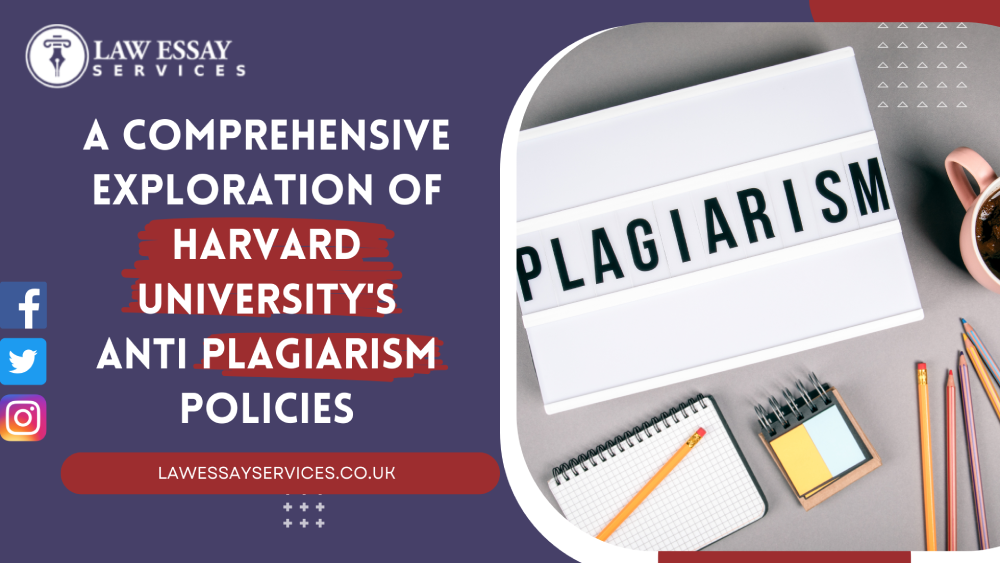A Comprehensive Exploration of Harvard University’s Anti-Plagiarism Policies

Harvard University, known for its commitment to academic excellence, places the greatest emphasis on maintaining the integrity of scholarly work through its strict anti-plagiarism policies. In this comprehensive exploration, we examine the multifaceted strategies and initiatives Harvard uses to combat plagiarism, fostering a culture of originality and ethical conduct.
Defining Plagiarism at Harvard: A Blueprint for Academic Integrity
At the heart of Harvard’s anti-plagiarism framework is a carefully crafted definition of plagiarism. The university leaves no room for ambiguity, outlining specific guidelines that cover various types of academic misconduct, from false referrals to collusion and fabrication issues.
Academic campaigns: Fostering a culture of academic integrity
Harvard recognizes the important role of education in plagiarism prevention. The institution goes beyond punitive measures, actively engaging in awareness campaigns, seminars and workshops designed to enlighten students about the intricacies of plagiarism. Through these initiatives, Harvard seeks to foster a deeper understanding of the importance of originality in academic work.
Plagiarism detection tools: A technological shield against academic misconduct
Harvard uses advanced plagiarism detection tools, which establish a strong line of defense against potential violations of academic integrity. These tools not only help faculty identify instances of plagiarism but also act as a deterrent, fostering a sense of accountability among students and fostering a commitment to honest academic practices.
Clear Consequences: The Weight of Accountability
Harvard’s anti-plagiarism policies establish transparent consequences for those found guilty of academic misconduct. From academic penalties to more severe disciplinary actions, these findings serve as a powerful deterrent, reinforcing the University’s uncompromising stance on maintaining academic integrity.
Faculty Guidance: The Formation of Ethical Scholars
Recognizing the faculty’s critical role in shaping the next generation of scholars, Harvard ensures that its faculty are well equipped to guide students on matters of ethical scholarship. Faculty members receive training and resources to guide students on proper citation practices, research ethics, and the importance of independent thought.
Adapting to the Digital Landscape: Meeting the Challenges of Modern Research
Harvard’s anti-plagiarism policies are dynamic, adapting to the challenges presented by the digital age. The University provides specific guidelines for citing electronic resources, addressing the changing landscape of information dissemination and the unique challenges posed by online sources.
Student support services: Fostering a culture of learning and growth
Recognizing that academic error can occur, Harvard offers strong support services to students who are avoiding proper referencing or other aspects of UK law essay services that offer plagiarism-free writing. These services are aimed not only at correcting errors but also at fostering a culture of learning, growth and resilience in the face of educational challenges.
Global collaboration: A united front against piracy
Harvard actively collaborates with academic institutions around the world to ensure a coordinated and consistent approach to plagiarism prevention. This global collaboration goes beyond the sharing of best practices and resources. It serves as a testament to Harvard’s commitment to maintaining academic integrity within the broader global academic community.
Conclusion
Harvard University’s anti-plagiarism policies are a testament to its unwavering commitment to maintaining the highest standards of academic integrity. Through a multifaceted approach that includes education, technological tools, tangible outcomes, and faculty guidance, Harvard fosters an environment where originality is celebrated, and scholarly practices are held to the highest standards. As a beacon of academic excellence, Harvard’s anti-plagiarism framework serves as a model for institutions around the world, demonstrating the importance of a comprehensive and proactive approach to protecting the integrity of scholarly work.
